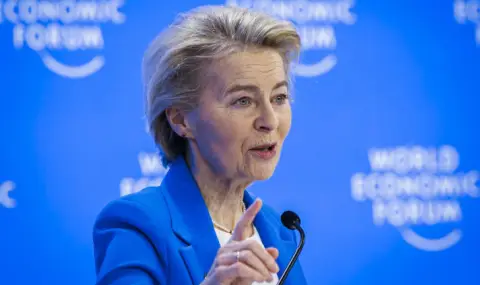The European Commission will present a roadmap in the next two weeks, which will set out guidelines for gradually stopping the import of Russian fossil fuels.
This was announced by European Commission President Ursula von der Leyen during the International Energy Agency (IEA) Energy Security Summit in London, Reuters reported, quoted by dariknews.bg.
Imports of Russian natural gas are decreasing to 18 percent of total imports of blue fuel in EU countries, down from 45 percent in 2021. However, there is still more to be done on this issue, the EC President said at the forum organized by the British government and the IEA.
The European Commission previously announced that imports of Russian fossil fuels into the European Union would be completely stopped by 2027 due to Moscow's military invasion of Ukraine.
A number of EU countries are compensating for the decreased imports of blue fuel from Russia by increasing gas supplies from Norway and with liquefied natural gas (LNG) from the United States. US President Donald Trump has announced that he wants the European Union to buy more LNG from the United States. EU officials have said it is an opportunity to reach an agreement with Washington on high tariffs on US imports imposed by Trump, Reuters recalls.
The European Commission is assessing various options for ending imports of Russian fossil fuels to be included in the roadmap, the agency reported earlier this week.
The options under consideration include using EU law to prohibit companies based in EU countries from signing new contracts for the supply of Russian gas. The possibilities of providing legal support to European companies, thanks to which they can terminate existing contracts for the supply of Russian blue fuel without being sanctioned, are also being discussed.
China, Russia and Iran met yesterday with representatives of the International Atomic Energy Agency (IAEA) to discuss Iran's nuclear program, Xinhua and Reuters reported, quoted by BTA.
The meeting was attended by Li Song, China's permanent representative to the IAEA, his Russian counterpart Mikhail Ulyanov and his Iranian counterpart Reza Najafi, as well as IAEA Director General Rafael Grossi.
It took place after Iranian Foreign Minister Abbas Araghchi's visit to Beijing this week.
At the meeting, the three countries stressed that political and diplomatic contacts based on mutual respect remain the only viable and practical path to resolve the Iranian nuclear issue. The three countries agreed that the IAEA and its Director General have the necessary potential and expertise to contribute constructively to this process, with the aim of supporting diplomatic efforts and resolving the issue in a positive and practical manner.
China and Russia expressed their support for Iran in strengthening dialogue and cooperation with the IAEA, Li noted. He stressed that Beijing appreciates Tehran's commitment not to develop nuclear weapons, respects its right to the peaceful use of nuclear energy, and supports the Islamic Republic in holding dialogues with all parties, including the United States, to safeguard its legitimate rights and interests through consultation and negotiation.
